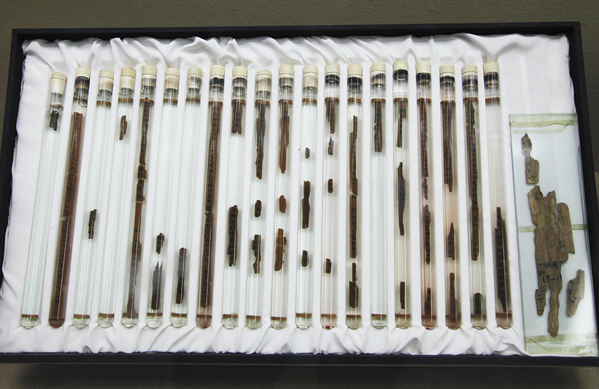Yinqueshan discovery answers historical questions

Inscribed Yinqueshan Han slips of The Art of War by Sun Tzu. Photo: VCG
The Yinqueshan discovery was very significant for China’s studies of ancient documents.
One remarkable outcome is the settling of long-term disputes about The Art of War and its author. There are some references to The Art of War by Sun Tzu and The Art of War by Sun Bin in the Records of the Grand Historian, composed by the Han historian Sima Qian in late 2nd century BCE, and in the Book of Han by the Eastern Han historian Ban Gu (32–92). However, after the fall of the Han Dynasty (202 BCE–220 CE), The Art of War by Sun Bin seemed to be lost because the Book of Sui, an official history of the Sui Dynasty (581–618), only mentioned The Art of War by Sun Tzu. Therefore, some historians believed that The Art of War by Sun Bin was never written and might be a forgery. There was also a guess that Sun Bin and Sun Tzu were the same person. The dispute over whether The Art of War by Sun Bin was ever written was settled when both of the texts’ fragments were found in the Yinqueshan Han slips.
This discovery confirmed the historical accounts of the early existence of The Art of War by Sun Bin, and that Sun Bin and Sun Tzu were different people. Sun Tzu (c. 545–470 BCE) was a military strategist and philosopher living in the Eastern Zhou Period (770–256 BCE) while Sun Bin was a military strategist living during the Warring States Period (453–221 BCE).
Some historians once believed that the ancient texts, Liu Tao (Six Secret Teachings) and Wei Liaozi, were not pre-Qin books but forgeries made by later generations. Slips of these texts discovered in the Yinqueshan tombs confirm that they were widespread at that time, thus dismissing the claims that they were forgeries.
Shouling Shoufa Shisan Pian refers to 13 chapters about the law, social and economic systems of the Warring States Period, including chapters Shou Fa (uphold the law) and Shou Ling (keep order). Some chapters recorded the economy of the Warring States Period. Before the significant findings at Yinqueshan, there were few documents about the economic development of the Warring States Period. Hence, these chapters, despite some of them missing or deteriorated, provides valuable information for studies of the economy at that time. One of the chapters, Tianfa (farming law), introduces the systems of land allocation and tax of the Warring States Period. The other chapters, including Bingling (the order of the army), Shoufa, Shouling and Wangbing (King’s army), not only helped correct some literal mistakes in the Wei Liaozi, Mozi and Guanzi, but also provided important information for research of the sources and evolution of these books.
Pian Yuqian is a senior editor from the Editorial Department at Zhonghua Book Company.
(edited by REN GUANHONG)
